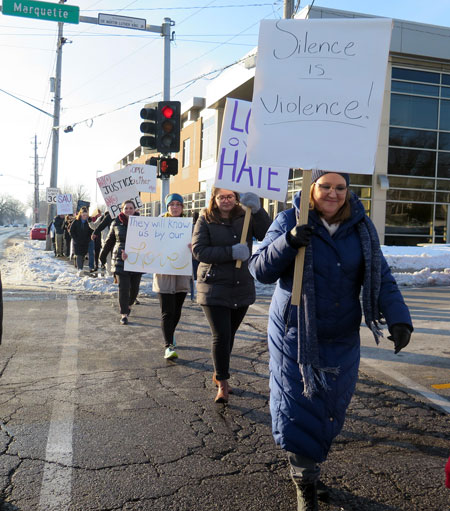
Students, faculty and staff from St. Ambrose University in Davenport walk during a silent march to commemorate. Martin Luther King, Jr. in this file photo.
By Lindsay Steele
The Catholic Messenger
Many people see racism as past history because slavery ended 150 years ago and the Civil Rights Movement took place 60 years ago. “Veggietales” creator Phil Vischer addressed this misconception in his video, “Race in America,” released in response to the murder of George Floyd, a Black man who died while in police custody in 2020. “Racial discrimination is illegal now. Heck, we even had a Black president!” Vischer says, sarcastically, in the video. The residual effects of past policies continue to affect Black individuals and families, he maintains.
The diocesan Social Action Office’s Lunch and Learn online program, held Jan. 5, featured the first part of the video on systemic racism. Discussion followed, with Father Rudolph Juarez, pastor of St. Anthony Parish in Davenport and Ryan Saddler, associate vice president for Diversity, Equity, and Inclusion at St. Ambrose University in Davenport. “We have to realize the years of damage that (racist policies) have done,” Saddler commented.
Deacon Kent Ferris, diocesan director of Social Action, began the program with a prayer from the U.S. Conference of Catholic Bishops’ (USCCB) “Open Wide Our Hearts” letter. “… We ask for your help in obtaining from your Son the grace we need to overcome the evil of racism and to build a just society. We ask for your help in following your Son, so that prejudice and animosity will no longer infect our minds or hearts but will be replaced with a love that respects the dignity of each person.”
In the video, Vischer acknowledges that white individuals, like him, tend to look at successful Black individuals, especially in entertainment and professional sports, as proof that racism no longer exists. However, the majority of Black individuals are at a disadvantage. “The average black household has 1/10th the wealth of the average white household. This didn’t happen by accident, it happened by policy,” he said. “We, the majority culture, told them where they could live and where they couldn’t. Then we moved most of the jobs to the places we told them they couldn’t live. When the predictable explosion of unemployment and poverty resulted in a predictable increase in drug use and crime, we criminalized the problem. We built $19 billion of new jails and sold grenade launchers to the police. As a result, a white boy born in America today has a 1 in 23 chance of going to prison in his lifetime. For a Black boy, it’s 1 in 4. And that is why people are angry.”
Vischer concludes the video with a simple request, prefaced by his acknowledgment that he does not know the right solutions. “I’m just here to ask you to do one thing … that begins every journey to a solution for every problem. What am I asking you to do? Care.”
Father Juarez and Saddler shared their thoughts about the video’s message. “You don’t want to think that things like this are so strategically planned out or so intentional, but obviously history teaches” that this was the case, Father Juarez said. “It goes counter to what we are supposed to be about in our country.” He said he knows some “very good people” who have grown up with the mythology of equal opportunity, non-bias and non-racism. “We have a lot of baggage to unpack. We have a lot of work to do.”
“I’m pleased to hear this conversation is still going on … if we can’t have dialogue, there’s no way we’re gonna move forward,” said Saddler, who is Black. “The undertone we get is that we’ve had successes in certain areas — a Black president, athletes, entertainers, etc. — but sometimes we get lost in the extremes.”
Some participants asked Father Juarez his thoughts regarding racism against Hispanics. Though the history and circumstances are not the same, racism against Hispanics exists, he said. He offered examples of how he and members of his family have been stereotyped or discriminated against because of the color of their skin.
“How we experience racism is the notion that you are not as good as somebody else. Much of my experience has been overcoming that sort of mentality not only in terms of people you encounter but also within yourself. These are things we as Hispanics are faced with day in and day out.”
Saddler believes that individuals have a responsibility to recognize the dignity of each person and to challenge themselves and others to do the same. “If you see something or hear something, intervene” in a safe way, he said. “Find a way to break (your) silence to show (you) are not consenting to what is being said. That would be my challenge.”
The Lunch and Learn session is available on the Diocese of Davenport’s YouTube page.
Book study opportunity
St. Anthony Parish in Davenport is hosting a book study on “Black Like Me” by John Howard Griffin, which takes place Mondays from 6-7:30 p.m. Anyone is welcome to participate. Contact Nancy Stone at nancjstone52@gmail.com for more information.











